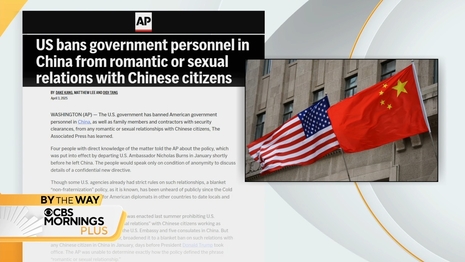 On Friday and Tuesday, CBS Mornings Plus covered a newly revealed policy change during the Biden administration and kept in place under Team Trump that federal government workers stationed in China are barred from engaging in romantic relationships with Chinese citizens out of fear of spies engaging in honeypotting, or seducing Americans to elicit information pertinent to our national security.
On Friday and Tuesday, CBS Mornings Plus covered a newly revealed policy change during the Biden administration and kept in place under Team Trump that federal government workers stationed in China are barred from engaging in romantic relationships with Chinese citizens out of fear of spies engaging in honeypotting, or seducing Americans to elicit information pertinent to our national security.
Incredibly, Congressman Eric Swalwell (D-CA) and his long-rumored tryst with Chinese spy Fang Fang never came up in CBS’s nearly eight minutes (7:45) of coverage.
Friday’s mention came up during the “Caught Our Eye” segment with co-host Tony Dokoupil calling it “a sign of the — the risk of Chinese spying and the security concerns that the U.S. has about it happening,” noting the Associated Press “reports that the U.S. has banned all U.S. government employees working in China from any sexual or romantic relationships with any Chinese citizen.”
Citing its unprecedented in the post-Cold War era, Dokoupil zeroed in on the seemingly obvious from the AP: “Intelligence services across the world have long used attractive men and women to obtain sensitive information.”
After noting this was done because “U.S. diplomats and intelligence experts say that Beijing continues to aggressively use so-called Honey Pots to access American secrets” and thus “not something only in the movies.”
 Co-host Adriana Diaz replied she “totally get[s] it” as “low-hanging-fruit intelligence” of sending someone out to “start a conversation in a bar” and then having “one thing lead[ing] to another and the intelligence can be at risk.”
Co-host Adriana Diaz replied she “totally get[s] it” as “low-hanging-fruit intelligence” of sending someone out to “start a conversation in a bar” and then having “one thing lead[ing] to another and the intelligence can be at risk.”
Dokoupil ended with the obvious question about what are people to do who are already seeing a Chinese national and working in the communist country: “[I]f you’re already a government worker in China and you’re in a relationship currently, you now have to apply for an exemption and if it’s denied, you have to break that relationship or leave the job. That’s how serious this is.”
Tuesday’s segment opened with a scene from the James Bond film Dr. No as a segue for Dokoupil to say “honey pot espionage is real,” defining it as “when undercover operatives — attractive ones typically — seduce someone to gain intel” and while “[i]t sounds like something out of a spy movie and often is, but it is also, I promise, and I just learned this myself, a very real strategy, a common one even.”
Joking he’s “learned so many things recently,” he rehashed the basic facts from Friday’s segment before saying he’s “want[ed] to know more,” so brought in CBS News contributor and former Obama and Biden administrations official Samnatha Vinograd to explain this was not, in fact, something that’s only transpired in movies.
Not surprisingly, she said it’s effective in part due to human emotions and the real psychological struggle of Americans often being stationed in foreign countries without their family and friends (click “expand”):
DOKOUPIL: I am naive apparently. I just thought that this was the imaginings of Hollywood, but apparently it’s the imaginings of espionage agencies all over the world. How big of an issue is it?
VINOGRAD: Well Tony, in the global game of espionage, seduction is one of the oldest tricks in the book and that’s why the U.S. government has, for decades, required its personnel, including me in government, to disclose any ongoing romantic relationship or sexual relationship with a foreign national. The U.S. government’s goal has been to ensure that its personnel aren’t being targeted by honey pots to get access to information and influence over policy. This shift to prohibiting U.S. Government personnel in China from engaging in any dating game with the foreign national while on the ground really speaks to the sophistication of the Chinese intelligence services and probably the effectiveness of honey pots in China in gaining access — [DIAZ AND DOKOUPIL LAUGH] — to U.S. government information.
DIAZ: Well, Sam, that was going to be my next question. How effective is this? Because when we talked about this on the show a few days ago, I kind of thought, like, yeah, this is low-hanging fruit in intelligence gathering. It’s easier to send out a honey pot than perhaps gather intelligence via other means.
DOKOUPIL: Yeah.
DIAZ: How effective is this?
VINOGRAD: It is an incredibly effective strategy. Foreign intelligence services want to get access to information and they prey upon individuals’ vulnerabilities. Loneliness, romantic feelings, sexual desires, those are a vulnerability and we’ve seen honey pots be incredibly effective over the course of history. And again, that’s why the U.S. government has required its personnel to report any of these relationships in the past and particularly when individuals are stationed overseas, oftentimes away from familym and friends, and things that they’re familiar with. They can be incredibly lonely and perhaps even more susceptible to exploitation and just not having their guards up when it comes to being targeted by foreign intelligence service.
She went onto explain the spies use all sorts of entry points given “[t]here’s a lot of ways to meet someone to date these days, whether it’s online, whether it’s at a sporting event, whether it’s at a bar and honey pots can be incredibly sophisticated” by “identify[ing] their targets…what their target likes to do, what their likes, what their dislikes are, and then, over time, because they’re so skilled, they very subtly start to solicit information and to report that back to headquarters.”
Dokoupil closed things with the reality this is more stereotypically an issue with men being seduced by female spies….which would have been a great time to bring up Swalwell, but alas, no dice (click “expand”):
DOKOUPIL: So, we’ve been careful with the language here. It’s gender neutral — we’re saying they. But, you know, I have a low enough opinion of men — [DIAZ LAUGH] — that my guess is — my guess —
DIAZ: I think you’re right. I think you’re right.
DOKOUPIL: — is that men are most frequently targeted and most frequently, it’s a woman who’s the honey pot.
VINOGRAD: Typically, it has been females acting as honey mot — honey pots and I will not offer comment on — [DIAZ AND DOKOUPIL LAUGH] — who’s more susceptible to having their romantic feelings exploited by foreign intelligence services. But the truth is, Tony, when I was stationed here in D.C., when I was stationed overseas in Iraq and the Middle East, I had to abide by the same requirements to disclose anybody that was a foreign national that I was dating or starting a relationship with, so that a security officer could run a background check and make sure that they weren’t a foreign spy. This shift, again, to prohibiting any kind of relationship overseas in China just really speaks to the sophistication of Chinese intelligence and the threat that Chinese intelligence just poses to U.S. national security.
To see the relevant CBS Mornings Plus transcripts, click here (for April 4) and here (for April 8).













